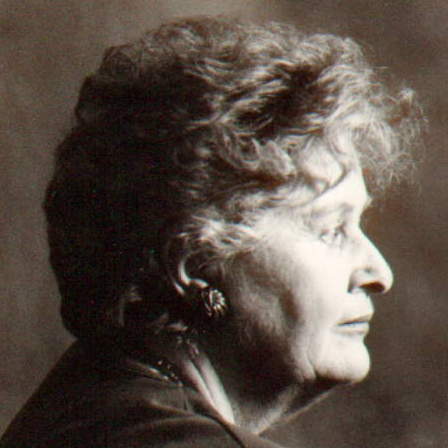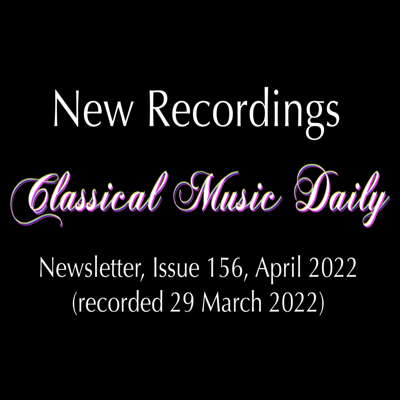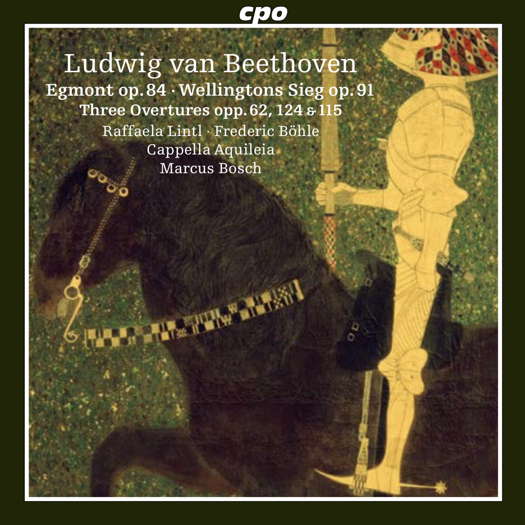- Michio Mamiya
- Michael Rayner
- Georg Frederic Handel
- Havergal Brian
- Phillip Glass
- Serge Koussevitzsky
- Adonis Lau
- Nicolò Foron
 SPONSORED: An Integral Part - Lindsey Wallis looks forward to the Canadian Music Centre's tribute concert to composer Roberta Stephen.
SPONSORED: An Integral Part - Lindsey Wallis looks forward to the Canadian Music Centre's tribute concert to composer Roberta Stephen.
All sponsored features >>
 VIDEO PODCAST: New Recordings - Find out about Adrian Williams, Andriy Lehki, African Pianism, Heinrich Schütz and Walter Arlen, and meet Stephen Sutton of Divine Art Recordings, conductor Kenneth Woods, composer Graham Williams and others.
VIDEO PODCAST: New Recordings - Find out about Adrian Williams, Andriy Lehki, African Pianism, Heinrich Schütz and Walter Arlen, and meet Stephen Sutton of Divine Art Recordings, conductor Kenneth Woods, composer Graham Williams and others.

Inner Energy and Passion
GERALD FENECH listens to Beethoven orchestral music
'... mouth-watering moments of great dramatic intensity ...'
Beethoven wrote the incidental music to Egmont between October 1809 and June 1810, and its premiere took place five days later to great success, particularly the Overture. The music was composed to form part of the 1787 play by Goethe, and it consists of an overture followed by a sequence of nine pieces for soprano and male narrator accompanied by a full symphony orchestra. The subject of the music and dramatic narrative is the life and heroism of the sixteenth century nobleman Lamoral, Count of Egmont from the Low Countries. At the time of its composition large swathes of Europe were under the dominion of Napoleon, something Beethoven refused to accept. In the music for Egmont the composer expressed his own political concerns through the exaltation of the heroic sacrifice of a man condemned to death for having courageously opposed the oppressive Spanish tyrants. The overture in particular is one of Beethoven's most expressive and powerful pieces and is one of the last works of his middle period. Its effect is so great that in the Hungarian Revolution of 1956 it was embraced as an unofficial national anthem.
Listen — Beethoven: Egmont Overture
(track 1, 0:00-0:54) ℗ 2021 Classic Produktion Osnabrück :
Wellington's Victory (also called the Battle Symphony) is an average fifteen-minute long work composed to commemorate Wellington's victory over Joseph Bonaparte at the Battle of Vitoria in Spain on 21 June 1813. Dedicated to the Prince Regent, later King George IV, its composition stretched from August to the first week of October 1813 and the piece proved to be a heartening money maker for Beethoven. Wellington's Victory was premiered in Vienna on 8 December 1813 at a concert to benefit Austrian and Bavarian soldiers wounded at the Battle of Hanau, with the composer conducting. It was an instant hit and the enthusiasm it aroused was unprecedented.
Listen — Beethoven: Sieges Symphonie (Wellington's Victory)
(track 22, 0:00-0:55) ℗ 2021 Classic Produktion Osnabrück :
The Consecration of the House, Op 124, was composed in September 1822 after a commission by the Director of Vienna's new Theatre in der Josefstadt, Carl Friedrich Hensler. It was first performed at the theatre's opening on 3 October 1822, and it was the first work Beethoven wrote after his revival of studying the works of Bach and Handel. It is no surprise that this overture bears their influence.
Listen — Beethoven: The Consecration of the House
(track 19, 0:00-0:56) ℗ 2021 Classic Produktion Osnabrück :
The Coriolan Overture, Op 62, was written in 1807 for von Collin's 1804 tragedy of the same name. The structure and themes follow the play very generally. The two main contrasting subjects represent Coriolan's resolve and war-like tendencies as opposed to those of his mother who wants him to abandon his crusade. Premiered in March 1807 at a private concert in Prince Lobkowitz's home, the piece was praised for its originality and stirring music and has remained a favourite ever since.
Listen — Beethoven: Coriolan Overture
(track 18, 0:00-0:59) ℗ 2021 Classic Produktion Osnabrück :
The Name Day Overture, Op 115, has never been one of Beethoven's more popular pieces. Written in 1815 and premiered on Christmas Day of that same year, it is dedicated to Polish Prince Antoni Radziwitt who was a great arts patron. The theme at the beginning is related to that which he used to set Schiller's Ode to Joy in the Ninth Symphony of nine years later. In spite of its late opus number it is a middle-period piece, and the composer inserted ideas which he had sketched between 1810 and 1814. The music is pleasurable but lacks that spark for which Beethoven is so famous.
Listen — Beethoven: Name Day Overture
(track 20, 5:55-6:54) ℗ 2021 Classic Produktion Osnabrück :
Apart from the Egmont short pieces and the Name Day Overture, this is music we all know and love. That said, Bosch and his exceptional ensemble keep serving up mouth-watering moments of great dramatic intensity that showcase all the sweep and power of Beethoven's orchestral mastery. Indeed, all the inner energy and passion of these pieces are executed with such overwhelming conviction that one has to stop and make a fresh appraisal of what is surmised to be familiar. Presentation, sonics and booklet notes are first-rate.
Copyright © 20 August 2021
Gerald Fenech,
Gzira, Malta

CD INFORMATION - BEETHOVEN: EGMONT; WELLINGTON'S VICTORY


